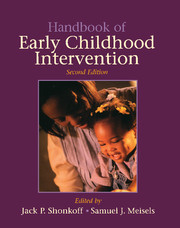Book contents
- Frontmatter
- Contents
- Foreword
- Preface
- Contributors
- PART ONE INTRODUCTION
- PART TWO CONCEPTS OF DEVELOPMENTAL VULNERABILITY AND RESILIENCE
- PART THREE THEORETICAL FRAMEWORKS FOR INTERVENTION
- PART FOUR APPROACHES TO ASSESSMENT
- 11 The Elements of Early Childhood Assessment
- 12 Assessment of Parent–Child Interaction: Implications for Early Intervention
- 13 Family Assessment Within Early Intervention Programs
- 14 Measurement of Community Characteristics
- PART FIVE SERVICE DELIVERY MODELS AND SYSTEMS
- PART SIX MEASURING THE IMPACT OF SERVICE DELIVERY
- PART SEVEN NEW DIRECTIONS FOR THE TWENTY-FIRST CENTURY
- Name Index
- Subject Index
13 - Family Assessment Within Early Intervention Programs
Published online by Cambridge University Press: 05 November 2011
- Frontmatter
- Contents
- Foreword
- Preface
- Contributors
- PART ONE INTRODUCTION
- PART TWO CONCEPTS OF DEVELOPMENTAL VULNERABILITY AND RESILIENCE
- PART THREE THEORETICAL FRAMEWORKS FOR INTERVENTION
- PART FOUR APPROACHES TO ASSESSMENT
- 11 The Elements of Early Childhood Assessment
- 12 Assessment of Parent–Child Interaction: Implications for Early Intervention
- 13 Family Assessment Within Early Intervention Programs
- 14 Measurement of Community Characteristics
- PART FIVE SERVICE DELIVERY MODELS AND SYSTEMS
- PART SIX MEASURING THE IMPACT OF SERVICE DELIVERY
- PART SEVEN NEW DIRECTIONS FOR THE TWENTY-FIRST CENTURY
- Name Index
- Subject Index
Summary
This chapter explores the context and processes of family assessment within early intervention programs for children with disabilities or developmental delays. Family assessments are now a routine, indeed mandated, practice in early intervention programs. Three primary reasons can be advanced for the value of family assessment for children with disabilities. First, family assessment recognizes explicitly the need to examine children's development within their most powerful context, that of the family. This requirement acknowledges that the development of young children is not biologically fixed but is conditioned to a large extent by their environment (Bronfenbrenner, 1992). Second, family assessment is grounded in the belief that parents can benefit from focused attention on their capacities for providing a nurturing, informed, and attentive environment for their children, particularly those with disabilities. Families' needs for information, guidance, and reassurance in the face of parenting a child with atypical development is presumed to be aided by a structured assessment of their current strengths, resources, and needs. Third, there is increasing recognition that the intensity and specificity of early intervention programs need to be tailored to the characteristics and functioning of the family in light of the child's disability or risk status (Guralnick, 1998).
Despite the clarity of its rationale, implementation of family assessment reveals deep-seated ambivalence from both parents and early intervention professionals. In its traditional form, family assessment implies a process of fact-finding, evaluation, and professional judgment about the capacities and vulnerabilities of individual families to provide an optimal environment for the growth and development of their children.
- Type
- Chapter
- Information
- Handbook of Early Childhood Intervention , pp. 290 - 308Publisher: Cambridge University PressPrint publication year: 2000
- 20
- Cited by

